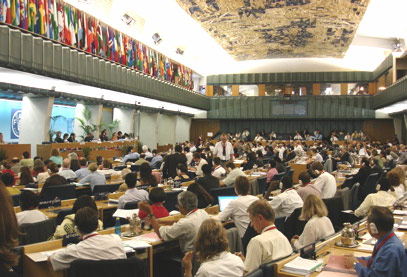Rome - 4th of July 2007. Americans are celebrating this day as a special holiday signifying freedom and independence. But it is a work-day here in Rome at FAO, the Food and Agriculture Organization's headquarters, where the Codex Commission is having its week-long yearly general meeting. Freedom and independence are not really high on the agenda at Codex - rather the contrary, as more and more rules are passed that curb individual choice but allow corporations to do what they do best - dominate markets.
Codex Alimentarius, the food rule-making body of the United Nations has invited delegates from all countries to the thirtieth session of the Codex Alimentarius Commission. The Roman headquarters of FAO is within a stone's throw of the Baths of Caracalla on one side and the oval arena of the Circus Maximus on the other, just down the road from the Colosseum and the Forum Romanum, the old cultural and administrative center of the city in its heyday of empire two millennia ago. What better place than this to forge the laws for a coming corporate empire...

The 30th Codex Alimentarius Commission meeting
The week-long meeting in Rome started Monday 2 July and is scheduled to end Friday or Saturday, leaving time for sight-seeing, but temperatures have already risen into the forbidding range beyond the 30 degree C mark - 86 degrees + in Fahrenheit, spoiling much of the fun of daytime excursions. But then - most of the action is in the evenings - in air conditioned hotels, good restaurants and favorite night spots.
The meeting's atmosphere is business-like, as you would expect from a world legislative body engaged in making the food laws for future humanity. And laws they are, even though the official word is that regulations and guidelines passed by Codex are 'voluntary' for the member nations. It is the World Trade Organization that provides the enforcement arm for those Codex rules, using them as the standard by which to adjudicate trade disputes. In consequence, no country can afford to contravene these rules, if it does not wish to risk heavy sanctions imposed as a penalty after a trade dispute.
Following this thought back to its logical conclusion, we arrive at a huge question, but one that is normally never asked: Who gave national ministry of health officials the authorization to commit their country to international laws that in time will bind their country without having been examined, much less approved, by national legislative assemblies?
- - -
Industry influence on Codex
For all intents and purposes, Codex Alimentarius unites over 150 accredited industry and other interest groups with an even larger number of national health authorities to make the rules for a globalized society where corporations have free reign and what they like to call a "level playing field". But the playing field they construct is so restricted by red tape and the level parts are so completely occupied by corporate interedsts that anything smaller than a multinational falls off the edges into commercial insignificance.